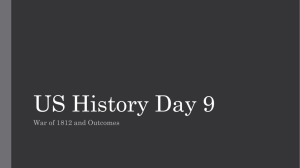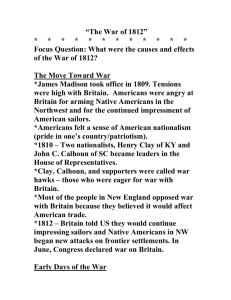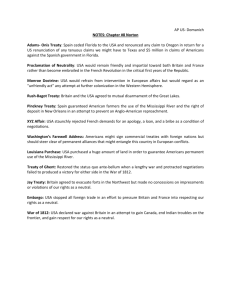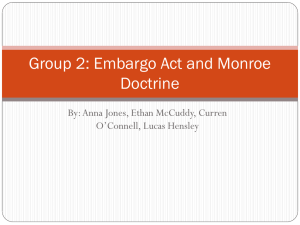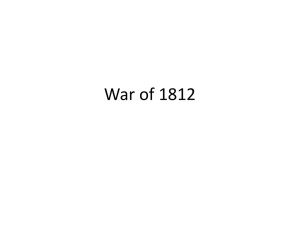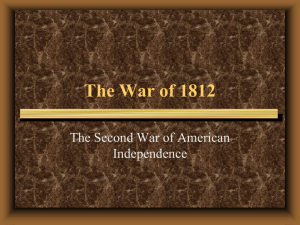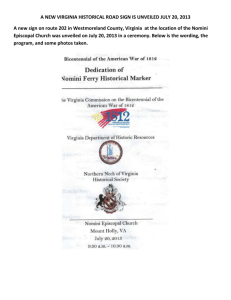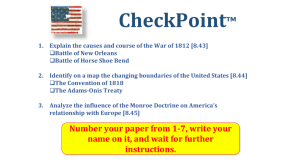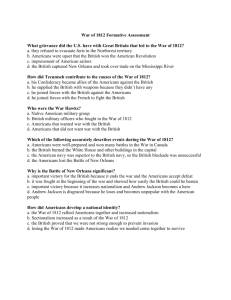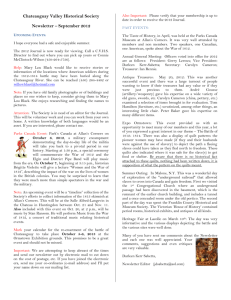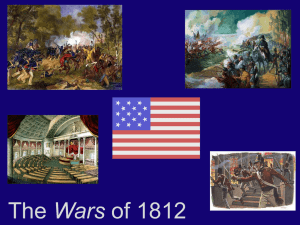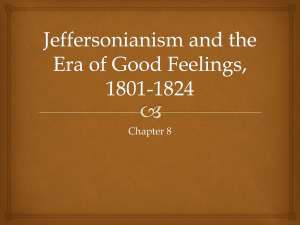War of 1812 DBQ: Causes, Consequences, and Significance
advertisement
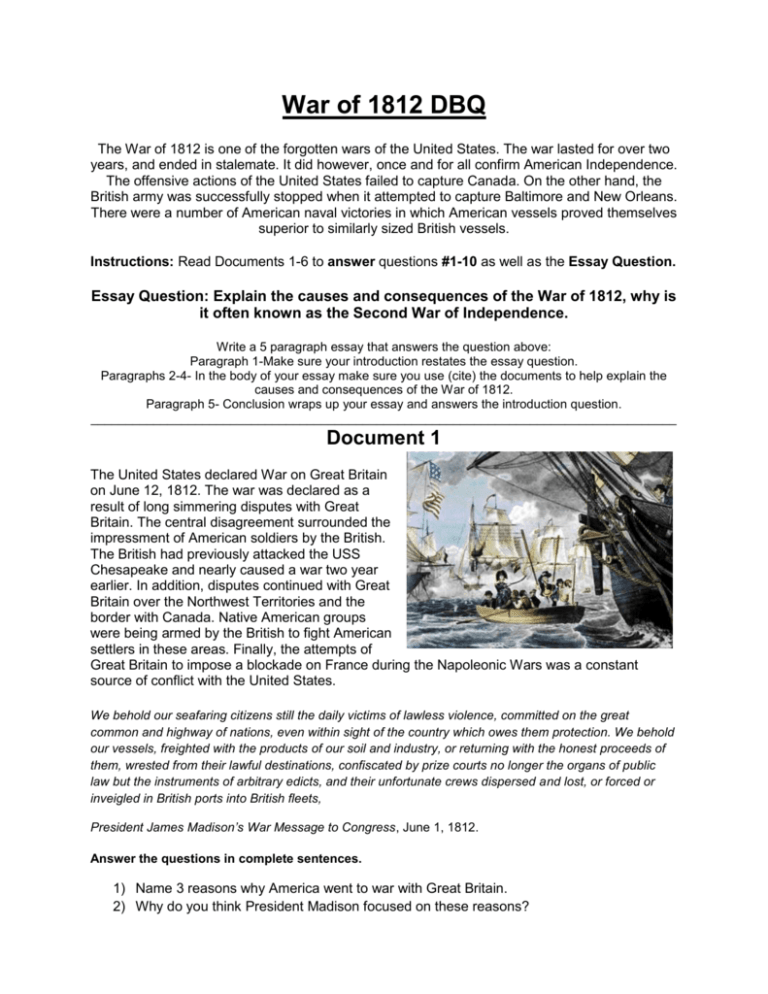
War of 1812 DBQ The War of 1812 is one of the forgotten wars of the United States. The war lasted for over two years, and ended in stalemate. It did however, once and for all confirm American Independence. The offensive actions of the United States failed to capture Canada. On the other hand, the British army was successfully stopped when it attempted to capture Baltimore and New Orleans. There were a number of American naval victories in which American vessels proved themselves superior to similarly sized British vessels. Instructions: Read Documents 1-6 to answer questions #1-10 as well as the Essay Question. Essay Question: Explain the causes and consequences of the War of 1812, why is it often known as the Second War of Independence. Write a 5 paragraph essay that answers the question above: Paragraph 1-Make sure your introduction restates the essay question. Paragraphs 2-4- In the body of your essay make sure you use (cite) the documents to help explain the causes and consequences of the War of 1812. Paragraph 5- Conclusion wraps up your essay and answers the introduction question. ____________________________________________________________________________________ Document 1 The United States declared War on Great Britain on June 12, 1812. The war was declared as a result of long simmering disputes with Great Britain. The central disagreement surrounded the impressment of American soldiers by the British. The British had previously attacked the USS Chesapeake and nearly caused a war two year earlier. In addition, disputes continued with Great Britain over the Northwest Territories and the border with Canada. Native American groups were being armed by the British to fight American settlers in these areas. Finally, the attempts of Great Britain to impose a blockade on France during the Napoleonic Wars was a constant source of conflict with the United States. We behold our seafaring citizens still the daily victims of lawless violence, committed on the great common and highway of nations, even within sight of the country which owes them protection. We behold our vessels, freighted with the products of our soil and industry, or returning with the honest proceeds of them, wrested from their lawful destinations, confiscated by prize courts no longer the organs of public law but the instruments of arbitrary edicts, and their unfortunate crews dispersed and lost, or forced or inveigled in British ports into British fleets, President James Madison’s War Message to Congress, June 1, 1812. Answer the questions in complete sentences. 1) Name 3 reasons why America went to war with Great Britain. 2) Why do you think President Madison focused on these reasons? Document 2 “Old Ironsides” the USS Constitution defeats British ship Guerriere 8/19/1812. Commodore Oliver Hazard Perry commanded the American fleet on the Great Lakes. He helped America win 9 battles in the area. 1. Capturing Fort George 2. Destroying the British ammunitions at Fort Erie 3. Rescuing five vessels from Black Rock 4. Building of the fleet at Erie 5. Getting the ships over the sandbar 6. Blocking British supplies on Lake Erie for a month prior to battle 7. Planning the Thames invasion with General Harrison 8. Winning the Battle of Lake Erie 9. Winning the Battle of Thames The victory at the Battle of Thames brought an end to the British threat in the Northwest. Native American leader Tecumseh lost his life during the battle, disabling native resistance. He and his people had been fighting on the side of the British. 3) Based on the information above what role did the US Navy and what role did Oliver Hazard Perry play during the war? 4) Why did Tecumseh and other Native Americans side with the British during the war? Document 3 O! say can you see, by the dawn's early light, What so proudly we hailed at the twilight's last gleaming: Whose broad stripes and bright stars, through the perilous fight, O'er the ramparts we watched were so gallantly streaming, And the rocket's red glare, the bombs bursting in air, Gave proof through the night that our flag was still there: And where is the band who so vauntingly swore That the havoc of war and the battle's confusion A home and a country would leave us no more? Their blood has washed out their foul footsteps' pollution. No refuge could save the hireling and slave From the terror of flight or the gloom of the grave! And this be our motto-- "In God is our trust!" And the star-spangled banner in triumph shall wave O'er the land of the free and the home of the brave. Francis Scott KeyStar-Spangled Banner, 1814 Francis Scott Key wrote the Star-Spangled Banner after witnessing the British attack on Fort McHenry in Baltimore, Maryland. 5) What symbol is Francis Scott Key referring to in the song? 6) Why do you think he wrote the song? Document 4 The British Army occupied Washington, D.C. and set fire to many public buildings following the American defeat at the Battle of Bladensburg. The facilities of the U.S. government, including the White House and U.S. Capitol, were largely destroyed. This has been the only time since the Revolutionary War that a foreign power has captured and occupied the United States capital. 7) What is the significance of burning of Washington DC? 8) How do you think the destruction of government buildings effected Americans? Document 5 Article I There shall be a firm and universal peace between His Britannic Majesty and the United States, and between their respective countries, territories, cities, towns, and people, of every degree, without exception of places or persons. All hostilities, both by sea and land, shall cease as soon as this treaty shall have been ratified by both parties, as hereinafter mentioned. All territory, places, and possessions whatsoever, taken by either party from the other during the war, or which may be taken after the signing of this treaty, excepting only the islands hereinafter mentioned, shall be restored without delay, and without causing any destruction or carrying away any of the artillery or other public property originally captured in the said forts or places, and which shall remain therein upon the exchange of the ratifications of this treaty, or any slaves or other private property. Treaty of Ghent – ended the War of 1812. 9) According to the treaty who gained territory as a result of the war? Did a side win the war? Document 6 Effects of War Increased Patriotism Weakened Native American Resistance 10) What were the effects of the War of 1812 on America? Growth of US Manufacturing
